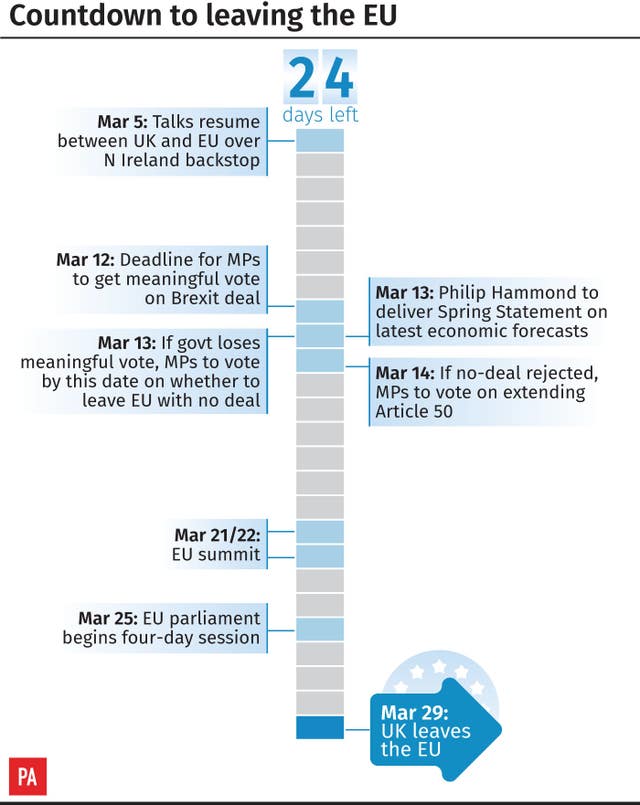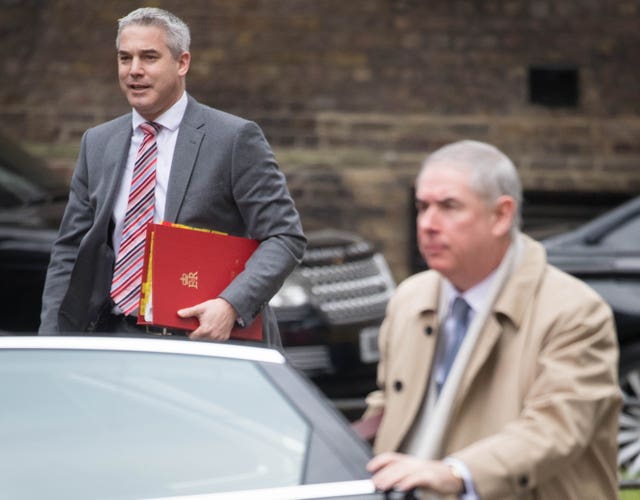
The UK is prepared to be “flexible” over how to address concerns over the Northern Ireland backstop, Jeremy Hunt said as efforts continued to end the Brexit impasse.
Attorney General Geoffrey Cox and Brexit Secretary Stephen Barclay are to hold fresh talks in Brussels in a renewed effort to secure changes to the backstop in order to allay fears that it could leave the UK trapped in a customs union with the EU.
Foreign Secretary Mr Hunt said Europe’s leaders were “prepared to be reasonable” as Prime Minister Theresa May presses for concessions from the EU that will persuade MPs to back her Brexit deal in next week’s expected crunch Commons vote.

Mr Hunt, who has been part of a diplomatic push in capital cities around the European Union, said: “I think the signals we are getting are reasonably positive. I don’t want to overstate them because I still think there’s a lot of work to do, but I think they do understand that we are being sincere.
“I think that they are beginning to realise that we can get a majority in Parliament because they are seeing the signals coming from the people who voted against the deal before who are saying, crucially, that they are prepared to be reasonable about how we get to that position that we can’t legally be trapped in the backstop.”
Mr Cox has reportedly dropped attempts to secure either a time limit or a unilateral exit mechanism from the backstop in the face of entrenched opposition from the EU.
Asked whether they were still the UK’s demands, Mr Hunt told BBC Radio 4’s Today programme that the crucial issue was avoiding an indefinite backstop and “how we get there is something we are prepared to be flexible about”.
That could mean a role for a “fair arbitration mechanism”, he said.
The DT reporting of the last 24 hours consists of misunderstood fag ends dressed up as facts. Some of it is accurate, much more of it isn’t and what is not is far more significant than what is. Complex and detailed negotiations cannot be conducted in public.
Get Outlook for iOS
— Geoffrey Cox QC MP (@Geoffrey_Cox) March 4, 2019
Mr Cox had earlier poured cold water on the claims about his demands being dropped, describing then as “misunderstood fag ends dressed up as facts”.
The Prime Minister is set to bring her deal back to the Commons for a vote by March 12.
If it is rejected, MPs will get the chance to either back a no-deal Brexit or call for the UK’s departure from the EU to be delayed beyond the current March 29 deadline.
Mr Hunt hinted that even if a deal is agreed, March 29 might not be an achievable date.
“We all want to leave at the end of this month,” he told Today. “It depends on how quickly we can get a deal through and then the time that’s necessary for the legislation.”
Mr Hunt said that although the UK would “find a way to prosper” in a no-deal scenario, it would cause “huge disruption”, adding: “I don’t think anyone in the Cabinet wants no deal.”

Mrs May’s hopes of winning over Tory Eurosceptics hinge on Mr Cox being able to change his legal advice about the indefinite nature of the backstop, which is intended to ensure there is no hard border on the island of Ireland in the absence of a future free trade agreement.
However, French President Emmanuel Macron signalled that he would firmly resist any measure that might diminish the security and integrity of the EU’s external border and internal market.
He also accused Brexiteers of lying about the consequences of leaving the EU and suggested Britain would end up being part of a reformed Europe in the future.
And European Council president Donald Tusk suggested that “external anti-European forces” had tried to subvert the Brexit referendum in 2016.
Speaking at a press conference in Brussels with Armenian prime minister, Nikol Pashinyan, Mr Tusk said he backed Mr Macron’s initiative, adding: “There are external anti-European forces, which are seeking – openly or secretly – to influence the democratic choices of Europeans, as was the case with Brexit and a number of election campaigns across Europe.
“And it may again be the case with the European elections in May.”
He urged “all those who care about the EU” to be vigilant of signs of interference in the May elections.
“Do not allow political parties that are funded by external forces, hostile to Europe, to decide on key priorities for the EU, and the new leadership of European institutions,” he said.
Eurosceptics on the so-called “Cash Council” of pro-Brexit lawyers – named after veteran Sir Bill Cash – said they would make a judgment on whether to vote an agreement once they had seen the details of any changes secured in Brussels.
Council member Michael Tomlinson said any document would have to meet the requirements of the Brady amendment, passed by the Commons in January, which called for “alternative arrangements” to replace the backstop.
“There are no documents for us to examine at this stage, but we look forward to seeing in due course what the Attorney has agreed, so that we may assess whether it meets the requirements of the Brady amendment, which commanded a majority in the House of Commons and calls for significant, legally-binding changes to the Withdrawal Agreement,” Mr Tomlinson said following the first meeting of the group at Westminster on Monday.
“We support the Prime Minister in seeking treaty-level changes, but pre-judging or speculating at this stage won’t help the re-negotiating efforts.
“The council has asked to be given all of the relevant documents in good time to consider them properly, in order to form a judgment in advance of a vote. Our primary objective is a proper analysis.”
A Downing Street spokeswoman said the Government aims to give MPs “sufficient” time to consider any new documents, but declined to provide details of how long before the meaningful vote they might be made available.
She said Mr Cox’s talks were “at a critical stage” and would “take as long as they need to take”.


Comments: Our rules
We want our comments to be a lively and valuable part of our community - a place where readers can debate and engage with the most important local issues. The ability to comment on our stories is a privilege, not a right, however, and that privilege may be withdrawn if it is abused or misused.
Please report any comments that break our rules.
Read the rules hereLast Updated:
Report this comment Cancel